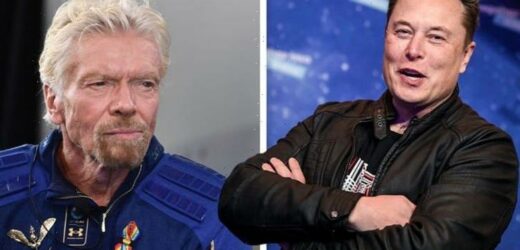Elon Musk discusses future of SpaceX's Starship system
We use your sign-up to provide content in ways you’ve consented to and to improve our understanding of you. This may include adverts from us and 3rd parties based on our understanding. You can unsubscribe at any time. More info
SpaceX’s rapid rise to the forefront of the spaceflight industry has been one of the great stories of success. Led by South African entrepreneur and tech mogul, Elon Musk, the company has cemented itself as a leader in the reusable rocket business. But a new space race is underway, one that is led by the planet’s richest individuals, and many would not want to see SpaceX rest on its laurels.
The billionaires’ space race came to a head this month when two space tourism companies launched their first crewed flights.
Sir Richard Branson, the Virgin empire tycoon, took the crown on July 11 with the launch of his Virgin Galactic firm’s Unity 22 mission.
He was followed soon after by Amazon and Blue Origin founder Jeff Bezos flying to the edge of space aboard his New Shepard rocket on July 20.
Both missions were hailed as major milestones for the space tourism and the spaceflight industries, with both billionaires promising to open up space for all.



And yet, some pundits believe the hype and excitement surrounding these flights belies an obvious truth: SpaceX has already won the space race.
SpaceX was, after all, the world’s first private company to launch humans into orbit, carrying astronauts to the International Space Station (ISS) on three missions so far.
According to Dr Robert Massey, astronomer and Deputy Executive Director of the Royal Astronomical Society, the services offered by Virgin Galactic and Blue Origin are “a rich kid’s playtime” and pale when compared to the spaceflight capabilities of SpaceX.
When Virgin Galactic’s SpaceShipTwo launched earlier this month, the rocket-powered spaceplane only flew to an altitude of about 53 miles (86km).
Blue Origin’s New Shepard, meanwhile, flew above the Karman Line – the internationally recognised border of space 62 miles (100km) up.
For comparison, the first man in space, Yuri Gagarin, flew twice as high as Virgin Galactic on the 1961 Vostok 1 mission.
Virgin Galactic: Richard Branson launches space flight
SpaceX, meanwhile, has developed the technology to regularly launch crewed missions more than 250 miles (402km) into space – and is being closely followed by Boeing under NASA’s Commercial Crew Program.
Dr Massey told Express.co.uk: “Although it’s been described as spaceflight, effectively Elon Musk has already won it by being the person who put people in orbit and has taken them to the space station and returned them to Earth.
“So you know, he’s already the winner in this, in a sense.
“I think being generous about it, what you can say is there is obviously innovation in private companies being involved with this and driving technology advances and so on.
“So if you end up with more interesting engine systems and systems to return to Earth and so, then it’s good.”
SpaceX achieved its first orbital flight on June 4, 2010, with the launch of its iconic Falcon 9 rocket.



It would take the company another 10 years before launching a human crew to the ISS.
Both Virgin Galactic and Blue Origin only launch their spacecraft to the edge of space high in the atmosphere, where paying customers will get to experience weightlessness for just a few minutes.
Dr Massey added: “Is it this the big paradigm shift that’s being described? I’m not sure that it is.”
It is, however, important to note both companies are investing in the ability to reach orbit.
Virgin Orbit, one of Sir Richard’s numerous companies, calls itself “the premiere dedicated small satellite launch service”.
Virgi Orbit launches small payloads using a start launcher – a plane that first carries a rocket strapped to its wing high into the atmosphere.

To date, Virgin Orbit’s LauncherOne rocket has only launched three times, of which the first mission was a failure.
Blue Origin is meanwhile working on the powerful New Glenn rocket.
Named after legendary NASA astronaut John Glenn, New Glenn is “a single configuration heavy-lift launch vehicle capable of carrying people and payloads routinely to Earth orbit and beyond.”
New Glenn’s first launch is presently pencilled in for late 2022.
SpaceX, meanwhile, is testing the Starship system – a two-stage spacecraft designed to carry humans to the Moon, Mars and possibly beyond.
Source: Read Full Article


